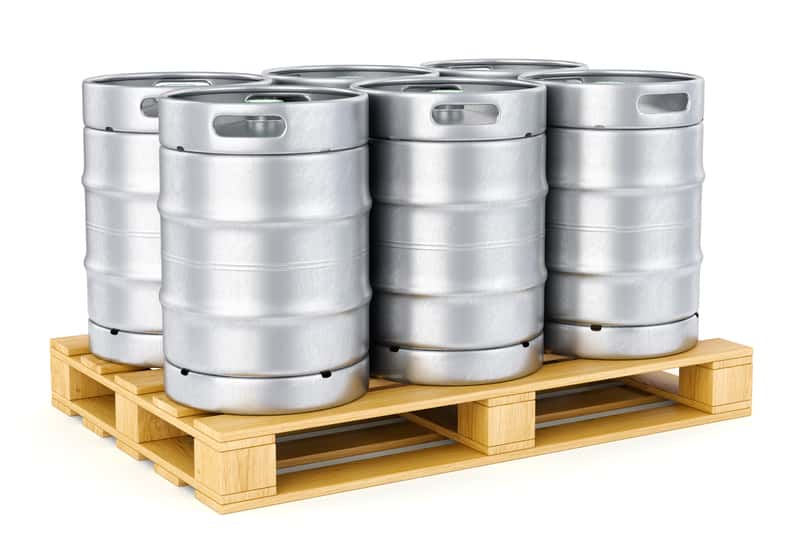Shipping Beer 101: Brewer Edition

June 16, 2021

Whether your brewery is up and running or you’re just in the process of getting your name out there, it’s understood that you probably want to get your beer into as many hands as possible. Sometimes, this takes the form of local festivals and events. Other times, you may look to do a tap takeover in a different city or want to do an out-of-town festival. Aside from personally delivering your beer, how do you get your beer from place to place? Many times, common questions around beer shipping and transport that may keep some breweries from taking the plunge.
At one point in a not-so-distant past, when certain rare and well-loved beers were next to impossible to get (like Cigar City’s Hunahpu Imperial Stout and Bell’s Hopslam), due either to a limited production or a lack of nationwide availability, consumers paved their own way when procuring their desired beverage. They traded products amongst themselves, shipping (largely illegally) from all over the country to ensure they got their hands on hard-to-come by brews.
Shipping in unconventional and unideal modalities, often with a lack of proper insulation and a fingers-crossed method of packaging, has made it hard to determine how to ship beer legally and safely, while also ensuring the quality and integrity of the beverage.
For businesses to ship beer or alcohol, there’s a bit to understand, from techniques to pricing. Learn the ropes and you can make decisions on how to ship your beer safely and securely from your brewery to consumers across the nation -- and the world!
What We’ll Cover in This Piece:
Reasons For Shipping Beer
Because only 13 states have provisions for shipping beer directly to consumers, the majority of breweries ship to other businesses or to festivals. Expanding to other cities and states allows breweries to build a following and brand awareness in other locales, and increase their sales.
However when breweries are pulled into new markets, either for distribution or collaboration, the beer has to make it from their brewhouse to its ultimate destination. More often than not, in-house delivery drivers are sticking to local distribution routes. And in most cases, it’s actually illegal to drive beer across state lines, or to ship your product across state lines without the proper permits.
This is where beer shipping enters the picture.
Self-Shipping

When shipping beer out of state, there are myriad rules and regulations, making the ins-and-outs a bit overwhelming. The variations of these statutory provisions can make self-distribution a challenge, with many states requiring a distribution company to serve as a middleman.
However, it can make sense for a brewery to ship on their own, especially in the beginning when it may be an every-once-in-a-while occurrence. This helps keep down costs.
If you want to try shipping by yourself, it’s important to be aware of your own state’s regulations as well as those of the receiving state. Some of these rules surround LPL, which refer to shipments of less than 1,000 pounds, and LTL, which refers more broadly to shipments between 150 and 15,000 pounds. There are also rules specific to beer, cider and mead.
While these provisions can be found within the National Conference of State Legislatures (NCSL) website, for those looking for outside help, there are companies well-versed in these logistics that can alleviate potential headaches and, more realistically, common mistakes that inhibit the reliability of a shipment.
Using A Beer Shipping Logistics Company

If you view shipping your beer as a serious opportunity, you may want to consider talking to a beer shipping expert. Brandon Arnold and his co-founder Adrian Gram started Brew Movers, a company that handles brewery shipping logistics. At the beginning of his career, Arnold worked on shipping logistics for general commodities. However, because of this experience, Nashville’s Southern Grist reached out to him for logistical guidance on shipping beer. When Arnold heard from a number of other breweries experiencing similar issues, he and Gram started Brew Movers.
“Brewers would show up to festivals and their beer would not,” Arnold says. Since he understood that it was important for breweries to focus on the brewing and showcasing of their beverages, he and his team stepped in to take over shipping logistics for independent breweries.
This evolved into other areas of service, specifically regarding a complete understanding of regulations and licensure, which is often challenging to decipher.
“When shipping with a company like FedEx, you cross your fingers and hope the product gets there,” Gram says. “When you have a company dedicated to the industry, their primary function is ensuring brewery deliveries, which is much different than simply shipping through an outside carrier.”
If you need to make sure your beer lands in a certain place at a certain time and don’t want to deal with potential regulatory mishaps, bringing on a beer-specific shipping company is the most cost-effective way to move beer from state to state.
Logistical Planning

Once you’ve decided how to ship, either internally or with the assistance of a consultant, it’s important to get an understanding of your timeline and the process.
“This all starts with the brewer,” Arnold says. “There has to be a clear understanding of the time table between the production cycle and distribution date and then it must be reverse-engineered in order to ensure a seamless shipping itinerary.”
For instance, in order to set the shipment up for success, a brewer or brewery must keep in mind freight transit times and where a beer would land on a specific day. This is crucial so a beer isn’t sitting in a hot warehouse for an entire weekend, where the product would be undoubtedly damaged.
Another thing to keep in mind is keg returns. Because kegs come at a high cost to breweries and are integral to the packaging process, communication with the distributor regarding keg type and return is an important step. For those who aren’t registered with a keg company, companies like UniKeg and Equipped Brewer offer cheap, lightweight one-way kegs that are both cost efficient and recyclable, meaning they don’t need to be returned. Using a one-way keg is the most common form of shipping and packaging for out-of-state festivals.
However, for those looking to use traditional kegs, consider shipping an entire pallet at once. That way, the kegs can be returned in a cost-effective way.
How To Keep Your Beer Safe During Shipping
Other than ensuring your product arrives at its destination at an optimal time, the best way to ensure the integrity of your product is to take packaging into account. Remember: pallets are your friend! Having simple tools in place when packaging bottles and cans, like corner stays and pallet wraps, are key to structural integrity. Without these things, it’s likely for pallets to collapse or become damaged during transit.
When thinking of the type of shipping necessary, differences in truck selection come into play. For local shipping, a dry van (not climate controlled) may work fine, while refrigerated trailers work better for longer distances. However, climate controlled shipping is usually expensive -- often two to three times the cost of a dry van. For warmer climates, it’s important to keep condensation in mind, as moving soggy boxes of beer is never ideal.
One solution to the high cost of climate controlled shipping is a product created by Brew Movers called the Pallet Parka. This relatively inexpensive device goes around a pallet and ensures that cans, kegs, bottles and other vessels stay at an optimal temperature during shipping. Because dry shipping is cost effective, utilizing a product like Pallet Parka can reduce shipping costs while maintaining your product’s integrity.
Shipping Beer Worldwide
While many independent breweries are focused stateside, there’s a growing international demand for American beer. When shipping worldwide, it’s important to ship temperature-controlled (cold-chain) for the duration of the trip.
As if US state-specific regulations weren’t difficult enough, there are import and export regulations to keep in mind. The shipper also handles the custom process and paperwork while working with partners on the receiving end.
However, just as there are companies like Brew Movers to help with US-based shipping logistics, there are several companies that handle the legwork of shipping overseas. Your best bet is to find a United States beer exporter like Brew Export to help navigate foreign paperwork and shipping law.
7 days Free - Untappd For Business
Untappd for Business can help increase your revenue while providing powerful insight and analytics about what your guests are drinking locally.
Get started by scheduling a demo with one of our experts or start a free 7 day trial - no credit card required!
